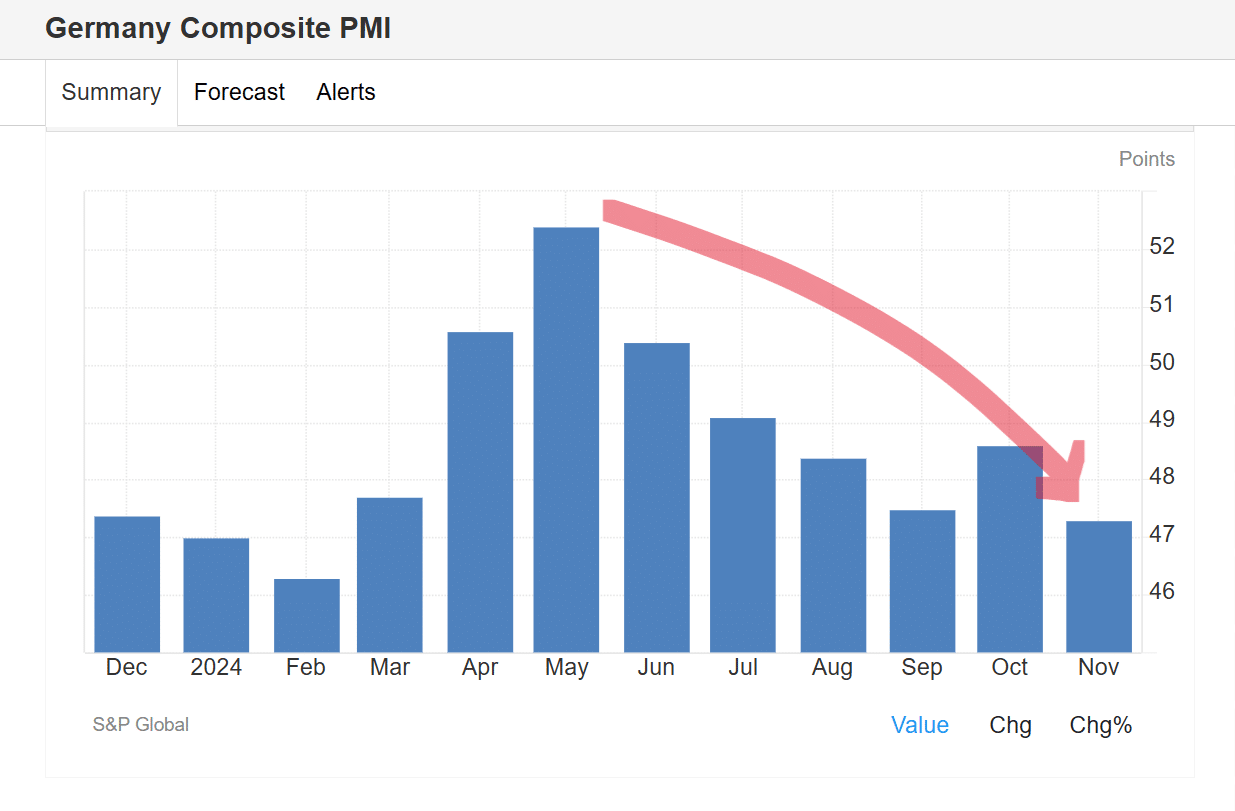Table of Contents
- 1 It is not just the German economy that is in trouble
- 2 Inflationary pressures will accelerate in November
- 3 Germany’s next government without a compass
- 4 The German economy drags the Eurozone into stagflation
- 5 What specific policy adjustments could Germany make to reverse the decline in its vital services and manufacturing sectors, considering the unique challenges Germany faces within the Eurozone?
From bad to worsethe German economywhich avoided formal decline in the third quarter only for a more statistical than meaningful reason. The PMI index for services fell to 49.4 points in November from 51.6 in October, to the lowest level since February last year. A drop below 50 points indicates a decline in activity, and above 50 the sector is growing. The numbers related to manufacturing are even worse: PMI rose slightly to 43.2 points from 43 in October, but still well below 50 points, a level it has not reached since July 2022.
And so the composite PMI index, ie which takes into account the two main economic sectors, fell to 47.3 points from 48.6 in the previous month and to the lowest level in 9 months. It has been below 50 since last July.
It is not just the German economy that is in trouble
And if the German economy shows signs of cooling, the French one is no different. Services fell to 45.7 points and manufacturing to 43.2 points. Thus the composite index fell to 44.8 points. A decline in GDP is also expected France for this last quarter of the year, after the incredible acceleration in the third, led by the Paris Olympic Games.
Inflationary pressures will accelerate in November
The situation in Germany, in particular, is cause for concern. A real political crisis is taking place in Berlin, with Chancellor Olaf Scholz to be voted out of confidence by the Bundestag on 16 December. Early elections are likely to be held on February 23. For another three months the Germans will be on the election campaign. Even worse, a new stable government is unlikely to be formed even after that. The European Central Bank (ECB) is expected to cut it interest rates for the fourth time also in December, but he cannot afford a risky move.
If it is true that the whole Eurozone is in trouble, there is a negative signal on prices coming from Germany: the inflationary pressures in the services sector they speed up in November, while they slow down in manufacturing.
But the tertiary sector makes up 72% of the German economy compared to just over 22% for manufacturing. This means that inflation in Europe’s largest economy could accelerate again this month, when it was already at 2% in October. Therefore, the ECB must be careful and this does not contribute to supporting domestic demand, while exports in the coming months will be at the mercy of the Trump administration’s tariff policy.
Germany’s next government without a compass
Germany needed to support the German economy. From? There are two other options: a debt route to raise them public investmentsstuck at 3% of GDP, among the lowest percentages in Europe; a combination of tax cuts, freeing up services and reducing bureaucratic burdens. In short, more debt than the current one Debt brake constitutional or reforms. The first hypothesis would become more likely with a government led by the Social Democrats, and the second would involve the next Christian Democrat chancellor. And, unfortunately, a new majority will emerge from the elections, again with no birds or birds. Another one is expected A great coalition in the Merkelian style, which resists no knots and gives one stroke to the barrel and one to the rim. No direction, no credible motivation to grow.
Not only should we be pessimistic about the nature of the next federal government, but among other things the time frame for its birth may not be short. In the meantime, Germany will continue with the temporary exercise, after being able to present a budget law for 2025. Real paralysis. As if that weren’t enough, it’s also in Paris political turmoil. Michel Barnier’s government does not have a majority in the National Assembly and is based on a sympathetic abstention from the Rassemblement National Marine Le Pen.
It will pass the 60 billion austerity package without a parliamentary vote, thanks to a constitutional provision. However, the left could have the right to vote on the no-confidence vote if the judges sentence its leader to a 5-year ban from holding elected office.
The German economy drags the Eurozone into stagflation
The German economy has no longer been a locomotive in Europe since the pandemic. The problem is that it becomes a burden. Instead of contributing positively to the growth of the region, it slows it down due to the decline of GDP and still high inflation and perhaps further growth of movement. There is a high risk of a destructive one “stagflation“ on the continent, especially if the price of gas were to be at current levels, after returning to being more expensive than a year ago. And even on the geopolitical front, the region shows no signs of life, caught between the position of the Biden administration and the position of the other tenor led by Donald Trump.
2024-11-24 19:20:00
#Germanys #economy #collapsing #inflation #falling #Eurozone #risk #collapse
What specific policy adjustments could Germany make to reverse the decline in its vital services and manufacturing sectors, considering the unique challenges Germany faces within the Eurozone?
## World Today News: Interview: Germany’s Economic Troubles
**Introduction:**
Welcome to World Today News, where we delve into the global currents shaping our world. Today, we’re focusing on the alarming signals coming from the heart of Europe: Germany’s faltering economy and its potential ripple effects across the Eurozone.
To understand this complex situation, we’re joined by two esteemed guests:
* **Dr. Thomas Schmidt:** Professor of Economics at the University of Heidelberg, renowned for his expertise on the German economy.
* **Ms. Sylvie Dupont:** Paris-based journalist and commentator specializing in European economic and political affairs.
**Section 1: The Symptoms of a Slowdown:**
**Q1:** Dr. Schmidt, the PMI figures paint a stark picture of the German economy, particularly in services and manufacturing. Are these merely blips on the radar, or indicative of a more serious downturn? What are the key underlying factors contributing to this slowdown?
**Q2:** Ms. Dupont, Germany’s economic woes are not isolated. The article mentions similar struggles in France. Does this paint a broader picture of a struggling Eurozone? What are the common threads weaving these economies together in this period of instability?
**Section 2: Political Impasse and Policy Dilemmas:**
**Q3:** Dr. Schmidt, the impending leadership change in Germany adds another layer of complexity. How might a new government – whether led by the Social Democrats or the Christian Democrats – tackle the economic challenges facing the country?
**Q4:** Ms. Dupont, France, too, is facing political uncertainty with the possibility of a no-confidence vote against Mr. Barnier’s government. Can these political instabilities further damage the fragile economic situation in both countries?
**Section 3: The Spectre of Stagflation:**
**Q5:** The article uses the term “stagflation” – a situation of stagnant growth combined with persistent inflation. How real is this threat for Germany and the wider Eurozone? What would be the social and economic consequences of such a scenario?
**Q6:** Dr. Schmidt, what policy measures could help Germany avoid the trap of stagflation? What role could the ECB play in mitigating this risk?
**Section 4: Looking Ahead:**
**Q7:** Ms. Dupont, what are the broader geopolitical implications of a struggling German economy for Europe and the world?
**Q8:** Both of you, are there any silver linings or potential opportunities for growth emerging alongside these challenges? What steps can individuals, businesses, and governments take to navigate this uncertain economic landscape?
**Conclusion:**
Thank you to Dr. Schmidt and Ms. Dupont for providing your valuable insights into this critical topic.
The future of the German and Jon Eurozone economies remains precarious, but careful analysis and proactive measures can help mitigate the risks and pave the way for a more stable and prosperous future.

